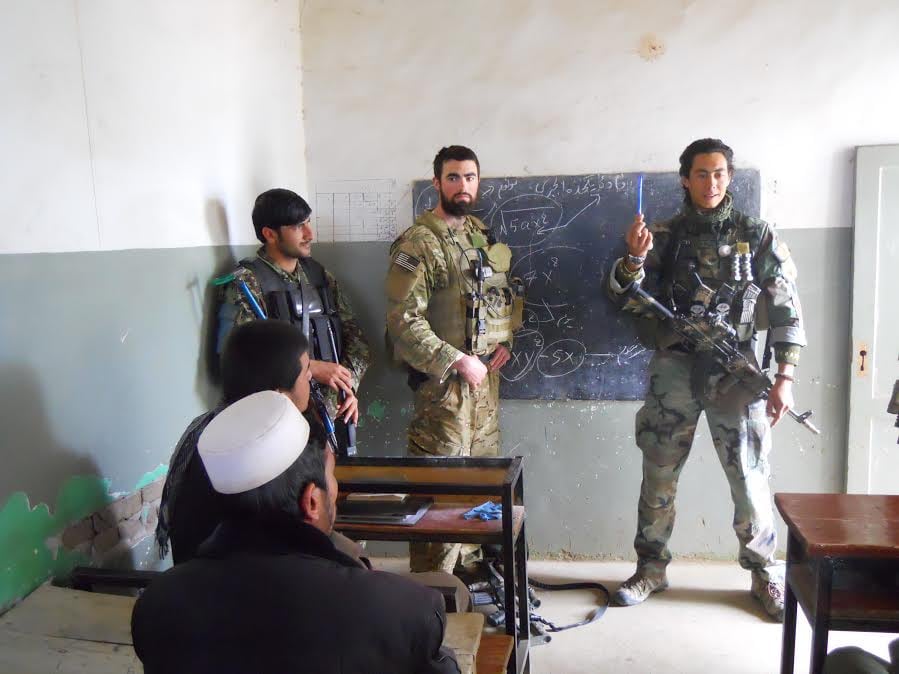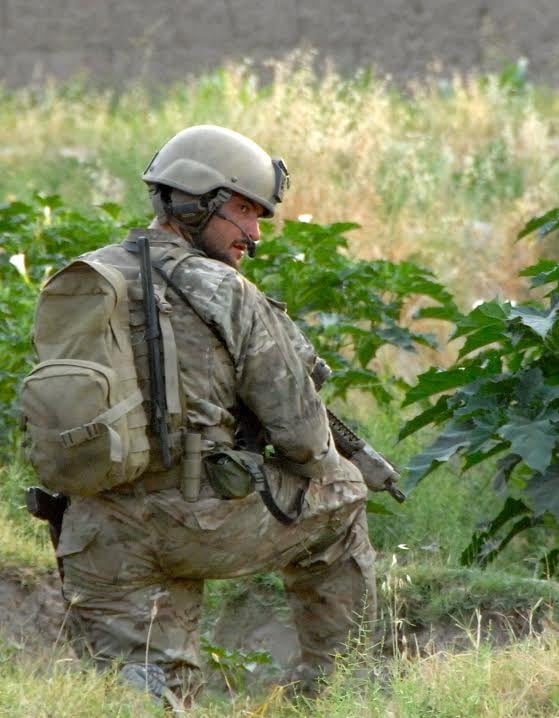The Green Beret getting kicked out because he beat an alleged child rapist in Afghanistan continues to gather supporters — including the rater whose negative review contributed to the force-out.
Sgt. 1st Class Charles Martland and his then-detachment commander have admitted to attacking an Afghan Local Police Commander in Konduz provice in 2011. Martland, a Bronze Star recipient, has served since then and wants to remain in the Army. But he has been flagged for involuntarily separation because of his role in the assault. He is scheduled to leave service no later than Nov. 1 after 11 years in the Army.
Martland’s story has already gained the vocal support of Congressman Rep. Duncan Hunter, R-Calif. Since media picked up on Martland’s story, t The VFW has voiced support, as well, and a House resolution has been was drafted that calls for the Army to reinstate the Green Beret since the media picked up Martland's story.
Many consider Martland a hero for his actions, especially in the face of reports U.S. soldiers were told to overlook sexual abuse of young boys — a common practice in Afghanistan, especially in the security forces.
The beating
Details of the 2011 incident were revealed in statements from Martland and his fellow Green Beret, Capt. Daniel Quinn, provided to Army Times by Hunter's office.
Rahman's men and neighboring ALP commanders confirmed the accounts, Quinn said. When confronted, Rahman allegedly confessed and laughed at Martland and Quinn.
"After the child rapist laughed it off and referenced that it was only a boy, Captain Quinn picked him up and threw him," Martland said in his statement.

Former Capt. Daniel Quinn works with locals while deployed in Afghanistan. He left the Army in 2012 after being sent home for attacking an alleged confessed child rapist. Quinn is advocating that Sgt. 1st Class Charles Martland, who participated in the attack, be able to continue to serve.
Photo Credit: Courtesy photo
Martland said he joined in, body slamming Rahman multiple times. After one body slam, Martland said he kicked him in the ribs; after another, he put his foot on his neck and yelled at him. He continued picking him up and throwing him for 50 meters toward the gate of the camp. Quinn gave him the final heave-ho through the gate of the camp.
"That night our company commander called with a report about it and Captain Quinn told the truth. We were flown to our [Advanced Operations Base] the next day, and immediately told to never speak of it, which I have not," Martland said.
Support from his rater
Retired Master Sgt. Anthony Sansone was Martland's rater for a Relief for Cause NCO Evaluation Report. Sansone gave Martland a career-killing "No" block for integrity on Army values, according to a memo Sansone wrote for the U.S. Army Enlisted Records and Evaluation Center.
Sansone expressed remorse in the memo and called Martland "one of the best soldiers I ever served with over my twenty plus years of service." He said the spirit of the negative aspect of the report was to correct an "isolated albeit serious incident."
"Had I known that giving him a 'No' block for integrity on Army Values would seal his fate professionally, I would have written it differently and challenged some of the guidance received on how to word that document," Sansone wrote.
But with the Army drawing down tens of thousands of soldiers, a black mark in an eval can haunt a soldier. Martland's violent actions have now caught up with him, four years after the fact. Quinn, meanwhile, left the Army voluntarily in 2012.
Army Times contacted Sansone by phone. He declined additional comment but said he "stands by" his comments in the memo.
The national commander of Veterans of Foreign Wars has publicly questioned the military's response. In a Sept. 24 statement John Biedrzycki Jr. said he wants to hear more on the matter because "it would appear that Martland is being punished for doing what I would hope anyone would do when encountering a wrong." Biedrzycki wants Defense Secretary Ash Cater to overturn the Army's decision to kick Martland out.
Meanwhile Rep. Vern Buchanan, R-Fla., has introduced a House resolution seeking to reinstate Martland in the Army.
Severe beating?
Col. Steve Johnson, was a lieutenant colonel and battalion commander for First Group 1st Special Forces Group in Afghanistan at the time of the incident. In an Aug. 31 article by The News Tribune in Washington state, Johnson said that, based on his discussions with Afghan leaders and the Green Berets, they beat him "within an inch of his life."
But Johnson never came to the camp nor spoke to anyone from the village in the aftermath, according to both soldiers; Martland said his entire team would swear to it. Johnson did not immediately respond to a request for comment; just before publication he requested questions be delivered through his command just before publication.
Quinn and Martland wrote that Rahman exaggerated his injuries, and denied having struck him in the head or face at any point. He was never knocked out, Martland said, and he ran away from the camp after the incident, which lasted no longer than five minutes. He added "if we had done what he claimed, he would have died, and his head would have shown severe trauma. His claims are not supported by the medical report."
Martland said he believes they did what they had to do.
"Kicking me out of the Army is morally wrong and the entire country knows it. While I understand that a military lawyer can say that I was legally wrong, we felt a moral obligation to act," wrote Martland.
Martland did not respond to Army Times requests for an interview and Quinn declined further comment.
Broader issue
His statement said all reports of abuse were to be reported through the chain of command, which would "take appropriate actions under applicable law," with U.S. commanders and Afghanistan government notified of abuse among Afghans.
But Martland and Quinn have said in statements they were hamstrung in the past when reporting abuse through the proper channels, often seeing nothing come of it. The need to create some sort of consequences had become strategic as well as moral to them: "our ALP were committing atrocities and we were quickly losing support of the local populace." And the chain of command reporting, he said, was allowing it to happen anyway.
"The severity of the rapes and lack of action by the Afghan Government caused many of the locals to view the ALP as worse than the Taliban. If the locals resumed supporting the Taliban, attacks against U.S. Forces would have increased dramatically," Martland wrote.
Johnson, in the News Tribune article, argued the opposite. He said ALP leaders were "straddling the fence" between government and insurgents, and that soldiers had to motivate through encouragement, not force.
"You cannot try to impose American Values and American norms onto Afghan culture because they're completely different," the battalion commander said, adding that "we do not have any power or the ability to use our hands to compel them to be what we see as morally better."
Quinn rejected the notion that their actions hurt relationships with ALP personnel.
"I spoke to a few of the village elders and other ALP commander and they all supported our actions, saying that we did the right thing because there would have been no justice from the local Afghan government. The Provincial Chief of Police later confirmed this," Quinn wrote.





